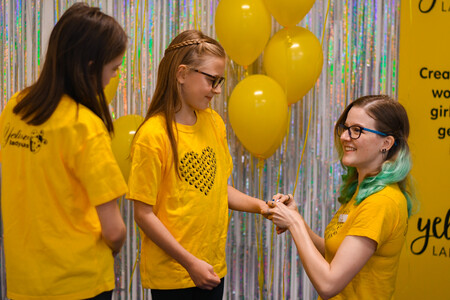What We Do
Connection
We are constantly learning and evolving and doing our best to reach as many members of the Yellow Ladybugs community as we can, through our educational events, workshops, our social media presence and online support groups. Our Local Connect programme provides an opportunity for families with school-aged ladybugs to find and connect with other registered families local to them.

Conferences, resources and other education opportunities
One of the most powerful ways we can advocate for change is to put neuro-affirming resources and information in the hands of everyone who has a role in supporting our community of autistic girls, women and gender diverse individuals. We do this by drawing on the professional and lived experience expertise of the autistic community to help us develop resources and educational opportunities for our community of parents/carers, teachers, allied heath professionals and autistic people. Our annual conference is our major educational event, but we also create many other learning opportunities each year.
Breaking down gender stereotypes
Autistic girls,women and gender diverse people are often misdiagnosed, misunderstood or missed completely. This is in part due to prevailing stereotypes, and the gender bias in the current diagnostic tools.
Many autistic girls and women and gender diverse autistic individuals (along with some autistic cis-males) have a more ‘internalised’ autistic presentation. Their needs are often hidden due to their ability to mask.
We are committed to breaking down all gender stereotypes, including the common misperception that autism is primarily a cis-male condition. We want to remove the barriers that make so many autistic individuals struggle to access diagnostic and support services .
Advocating for our community
Yellow Ladybugs also has a strong advocacy mission. Over the years we have spoken strongly and passionately about the importance of putting autistic voices and experiences at the centre of every political inquiry that has an impact on our community of autistic girls, women and gender diverse individuals. We have made multiple submissions and spoken at public hearings including the 2020 Royal Commission into Mental Health (Victoria), the Senate Inquiry into Autism in 2021, the Royal Commission into Violence, Abuse, Neglect and Exploitation of People with Disability. We are members of the Autism Advisory Groups for the Department of Education, Victoria and the Department of Families, Fairness and Housing, Victoria. In advocating for ongoing autistic input into policy development and implementation we regularly work with partner organisations including Amaze, Different Journeys, The I CAN Network, Asperger’s Victoria, The Association for Children with Disability and the Olga Tennison Autism Research Centre .
Celebrating neurodiversity
As an autistic-led organisation, we are committed to listening to all autistic individuals and amplifying their stories. We recognise that many autistic women and gender diverse people have spent most of their life wearing a mask, and that it can be difficult for them to be believed when they speak of their lived experience. We are working to change this.
Yellow Ladybugs also actively celebrates the diversity within the community of autistic girls, women and gender diverse individuals. We take a respectful stance towards differing views, experiences and opinions, as these perspectives all serve to enrich our understanding of what it is to be autistic. We maintain that there is no right or wrong way to be autistic, and that all expressions of autism are valid and valuable. This is how we celebrate neurodiversity.
Talking about autism – language, preference, acceptance
We use identity-first language. We say ‘autistic’ rather than ‘has autism’ to respect our community’s preferences. We believe that our word choice can help to:
- reframe the conversation on autism
- remove the stigma and focus instead on acceptance
- celebrate neurodiversity.
